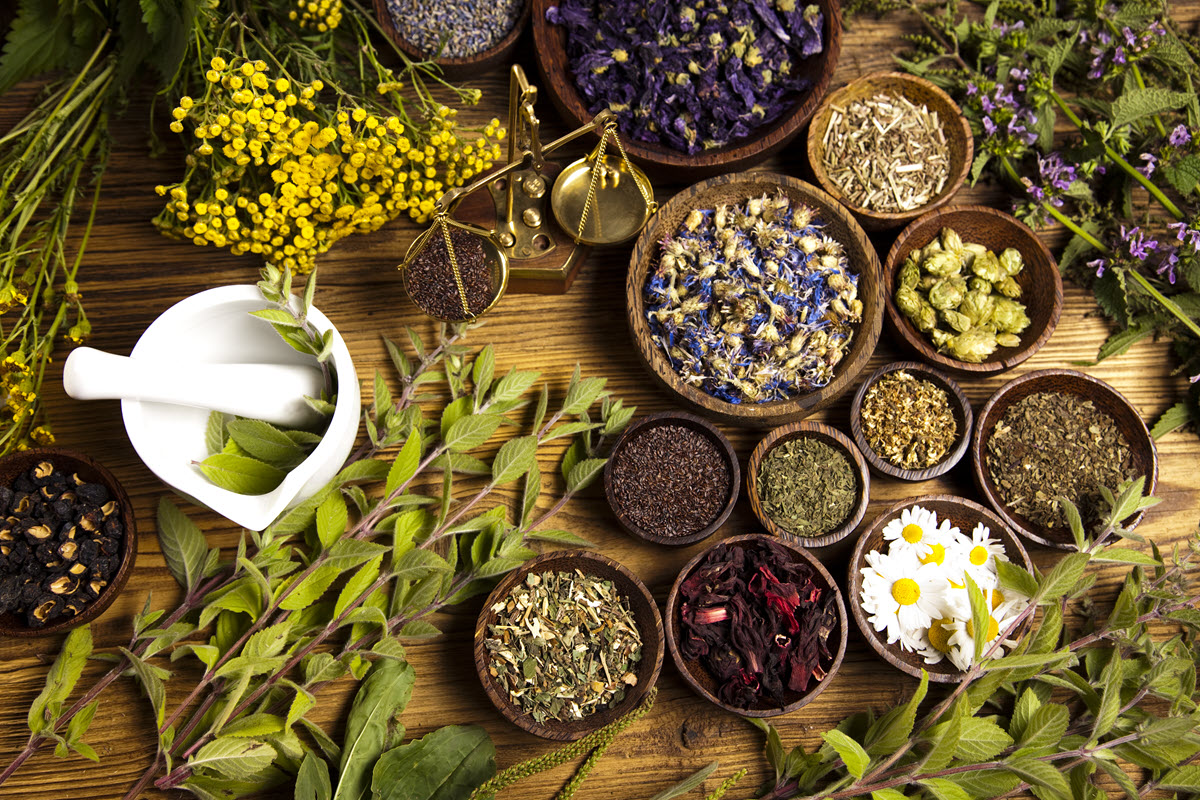
Herbal Teas: Know the Risks So You Can Enjoy the Benefits
Many tea drinkers enjoy the benefits of herbal teas, including the growing range of flavors, ingredients, and blends. Such teas add freshness, originality, subtlety, and nutritional value to tea drinkers. Many tea drinkers also assume they are receiving herbal tea’s health benefits.
Yet the critical question is, “are herbal teas good for you?” This article addresses the risks of herbal teas and aims to answer that question.
But be warned, the answer is cautionary. So the downbeat note is, do you know what you’re drinking and how it affects your body?
- What is in herbal tea?
- What does the research say about herbal tea?
- Is the information about it accurate?
- What are the dangers of herbal tea?
- How can you reduce the risks of drinking herbal tea?
What is in Herbal Tea?
Of course, the obvious answer is herbs, the mild, aromatic, and natural harvests from plants that people consume.
An example is a herb with a lovely name, belladonna, with an extended therapeutic history. The belladonna flower is a herb from the same family as tomatoes, potatoes, and tobacco.
Belladonna’s uses include treating asthma, pneumonia, indigestion, and muscle weakness. In addition, it can relieve headaches, irritable bowel syndrome, and menopausal symptoms and relax blocked airways.
Yet there’s a common, less enchanting, name for belladonna: deadly nightshade.
In very low doses, the Belladonna flower has medicinal properties but is fatal in higher quantities. It’s a very poisonous plant, containing up to 20 different and powerful alkaloids.
This example demonstrates the most significant risk of herbal teas; depending on the dose, the same plant can be medicinal and harmful.
No tea brand offers a “Belladonna Bedtime” (Product pitch: You’ll sleep forever!), but most tea lovers are surprised by the dangers many common herbs used in tea can carry.
The very fact that many herbal teas have proven health benefits is, in and of itself, a warning.
Such facts are cautionary because it means the herbs interact with your body, and those interactions occur at the neurological and chemical levels. The compounds in herbal tea are not inert, and the medical benefits such herbs provide come from their powerful chemical impacts.
This realization gives you a new perspective on common herbal teas. This includes tisanes such as spearmint, ginseng, hibiscus, St. John’s wort, chamomile, valerian, lavender, lemongrass, and others.
Take, for example, spearmint, ginseng, hibiscus, St. John’s Wort, and ginkgo.
- Spearmint is healthy but can affect kidney functions when mixed with various medications.
- The benefits of ginseng include an increase in stamina and concentration. Yet, it can reduce the effectiveness of anti-clotting medications (blood thinners) and cause bleeding in post-menopausal women.
- Hibiscus lowers blood pressure by around seven points. Yet, it negatively affects estrogen levels and can produce hallucinations.
- The benefits of St. John’s Wort include improving depression and mood disorders. Yet, the herb can cause headaches, nausea, dizziness, and dry mouth. It may also make you more likely to get sunburned.
- Ginko can help fight inflammation. Yet, it can thin your blood and cause bleeding.
Your body doesn’t distinguish between a herb and a drug; too much herbal tea can harm you.
(Valerian has more than 500 potential interactions, so you should have a drug screen.)
What Does Research Say About Herbal Tea?
Research examining the kinds of herbal plants used in tisanes is not pervasively negative. Yet, it has cautionary examples and too many red flags to ignore. The benefits of drinking herbal tea are widely publicized; however, the risks are less so.
The National Institute of Health’s Library of Medicine offers this peer-examined overview of the Efficacy of Herbal Medicine, which states: Several specific herbal extracts have been demonstrated to be efficacious for specific conditions. Even though the public is often misled to believe that all-natural treatments are inherently safe, herbal medicines do carry risks. Ultimately, we need to know which herbal remedies do more harm than good for which condition. Because of the current popularity of herbal medicine, research in this area should be intensified.”
What Are The Dangers of Herbal Tea?
Mistaken Assumptions
Consumers often assume “all natural” remedies are safe. Unfortunately, this is not the case; many herbal plants can harm your health.
For example, WebMD cautions consumers about five risky herbal supplements:
- St. John’s Wort,
- Kava,
- Comfrey,
- Chaparral, and
- Pennyroyal.
Even herbal teas you assume are gentle and mild can have powerful impacts in larger doses. For example, chamomile is considered gentle, effective, and calming nighttime tea.
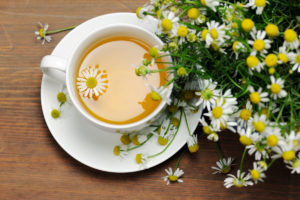
Chamomile has been used since the dynasties of Ancient Egypt for its medicinal properties. Today, according to estimates, one million cups of chamomile tea are consumed daily in the United States.
The health benefits of chamomile tea include the following:
- easing digestion,
- anti-inflammatory properties,
- antibacterial properties,
- reducing stress, and
- soothing depressive impacts.
Amid such a broad spectrum of benefits, it’s easy to understand why few people ask: is chamomile tea safe? Is drinking too much chamomile tea bad for you?
Chamomile tea’s side effects are serious. They include bleeding risks and severe drowsiness if mixed with alcohol and can be dangerous during pregnancy.
Herbal Tea Can Interact With Medications
Herbal teas’ interactions with medications are mainly unknown to the layperson. Most people don’t know or understand the interactions between herbal teas and common prescription drugs.
Yet many of the adverse effects of herbal tea come from interactions with medications. For example, when combined with herbal teas, blood thinners, anti-coagulants, and aspirin can cause liver and kidney damage.
The side effects of herbal teas interacting with your medication can be life-threatening. Therefore, informing your physician about what herbal teas you consume is extremely important.
A Mayo Clinic report states herbal compounds caused 1-in-5 deaths from non-ailment-related liver failure. This figure has doubled in ten years, correlated with the growing popularity of herbal teas.
Ginseng Tea
Warfarin is a blood thinner and the leading medication for reducing blood clots. If you are taking it, you must be careful drinking herbal tea. Certain tisanes (e.g., Ginseng tea) raise the likelihood of severe bleeding. Since ginseng may cause trouble sleeping, do not take it near bedtime, advises WebMD. Ginseng should not be used for long periods.
Valerian Tea
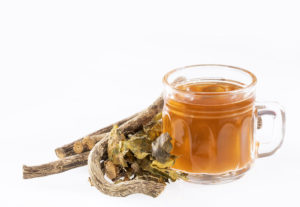
Valerian tea benefits you by acting as an excellent sedative and sleep aid. Many mass-market tea brands promote valerian tea for sleep due to these properties. In addition, they often offer enticing blends (e.g., DavidsTea, Valerian Nights).
Yet physicians and medical professionals warn of the many dangers of valerian root tea. Valerian tea acts like a medical anesthetic; therefore, individuals should get specific advice before consuming it.
Healthcare professionals also suggest avoiding using valerian tea with many medical prescriptions. They also advise discontinuing long-term use. For example, stopping Valerian tea consumption for two weeks before any surgical treatment is recommended, and women should avoid it during pregnancy.
This statement is commonplace in reviews of valerian:
“However, [this and several other herbs] are powerful drugs that should be used only under the consultation of a medical professional, not used casually as a beverage.”
Yet, not one of the more than 500 ads for valerian root tea on Amazon mentions the risks.
Misleading and False Claims Add Complexity
The facts are troubling.
The tea products you buy are often falsely labeled. For example, frequently, herbal tea contains unlisted or misstated ingredients. In addition, tea and herbal blends typically aren’t tested, and often unsupported claims are made about the combinations.
Many regulatory and legal gaps exist from herbal production through to distribution. Unfortunately, these gaps provide many opportunities for producers and retailers to engage in fraud and cut corners.
Figures like these matter:
- 14-33% of tea products sampled were mislabeled (2013 study in the United States)
- Ingredients were authenticated in fewer than half the tea in DNA barcoding tests (2013 study in the United States)
- 20% of tea products contained unlisted fillers like rice and soy (2013 study in the United States)
- Only 21% of tested herbals sold in CVS, GNC, Walmart, and Target were accurately labeled (2015 study in the United States)
- 24% of “herbal” imports contained prescription drugs (2017 study conducted in Australia)
- 80% did not follow labeling requirements (2017 study conducted in Australia)
In 2019, Scott Gottlieb, MD, an FDA commissioner, said, “Health fraud scams prey on vulnerable populations, waste money, and often delay proper medical care.”
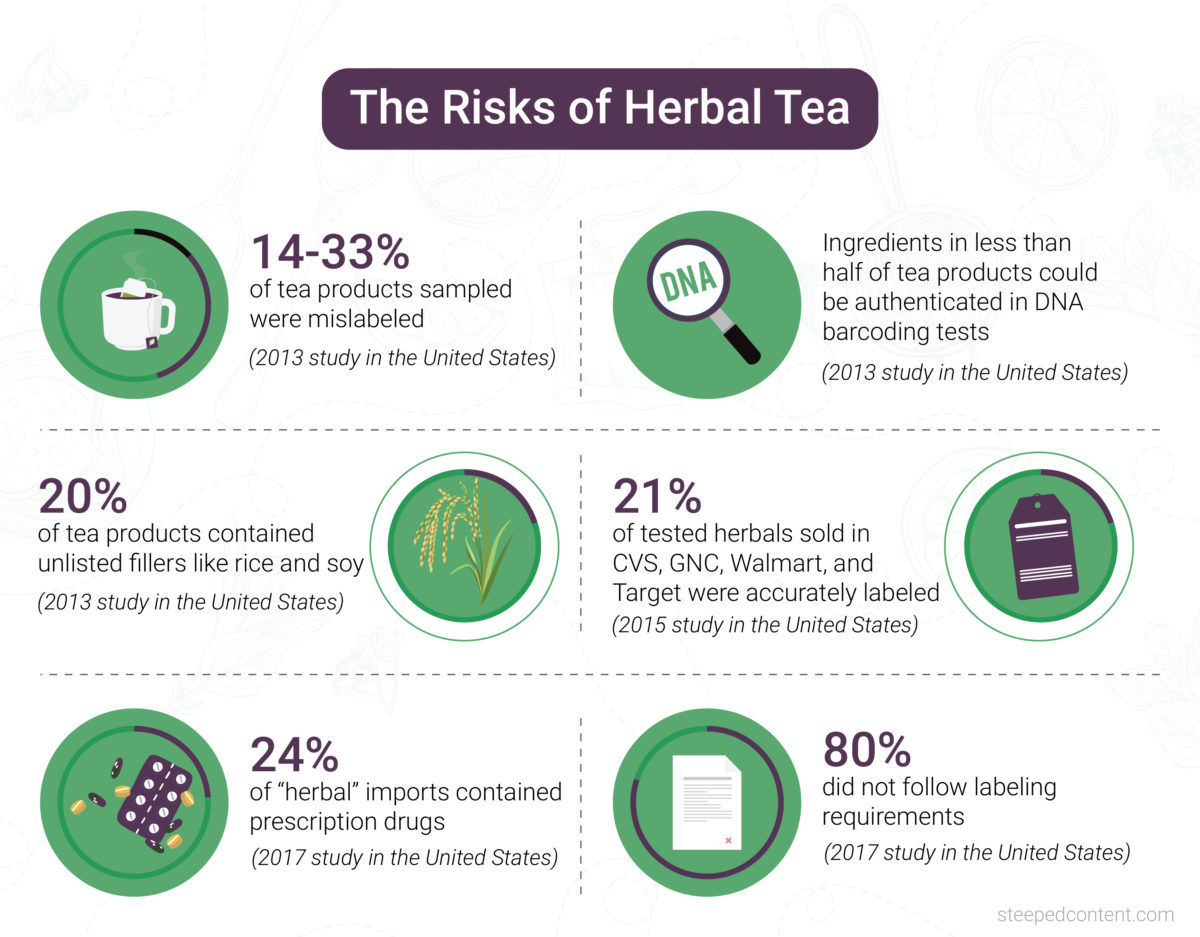
How You Can Reduce The Risks of Herbal Tea
You can take the following five steps to reduce the risks of herbal tea while still enjoying its benefits.
Buy From Reputable Brands
Buy herbal teas from companies with a reputation for offering high-quality tea blends. Tea businesses that make outstanding caffeinated whole-leaf tea blends will most likely make exceptional herbal blends.
Generally, herbal tea specialists highlight what makes their product premium and fully showcase its features (including risks) to differentiate it.
Check Where the Product Was Sourced
Take the time to examine where your herbal tea ingredients were sourced. Sellers often brand products with certifications (e.g., Fair Trade, Rainforest Alliance, The Union for Ethical BioTrade).
These certifications ensure consumers can trust in product integrity. Ingredients are sourced from vetted growers through collaborative relationships.
You should check for product testing. Such testing proves the herbal tea meets the legal requirements and the brand’s claims. In addition, lab testing herbal tea can authenticate the supply chain and ensure your safety. On the other hand, why take any risk if the ingredients are not listed with evidence of authenticity?
Think Belladonna, Not Tomatoes
Herbal does not mean gentle and safe. Don’t discount the powerful impacts of plants used in tisanes.
Consumers can access research to investigate herbal tea’s impact on them. Sources like PubMed make it easy for consumers to check the basics of drug interactions and the probability of microtoxins. Such online sources also provide information about side effects and dosages.
Keep Your Physician Informed
Regular consumption of herbal tea with a dominant ingredient is a medication. Share this information with your physician to be safe.
It is wise to assume that mixing herbal teas and medicine is not ok.
Be Cautious of Herbal Dietary Supplements
Be wary of herbal dietary supplements and extracts – including green tea compounds.
Miracle-working, celebrity-rave, pseudo-medication teas have one proper place in a ziplock bag – you take them to a drug disposal site.
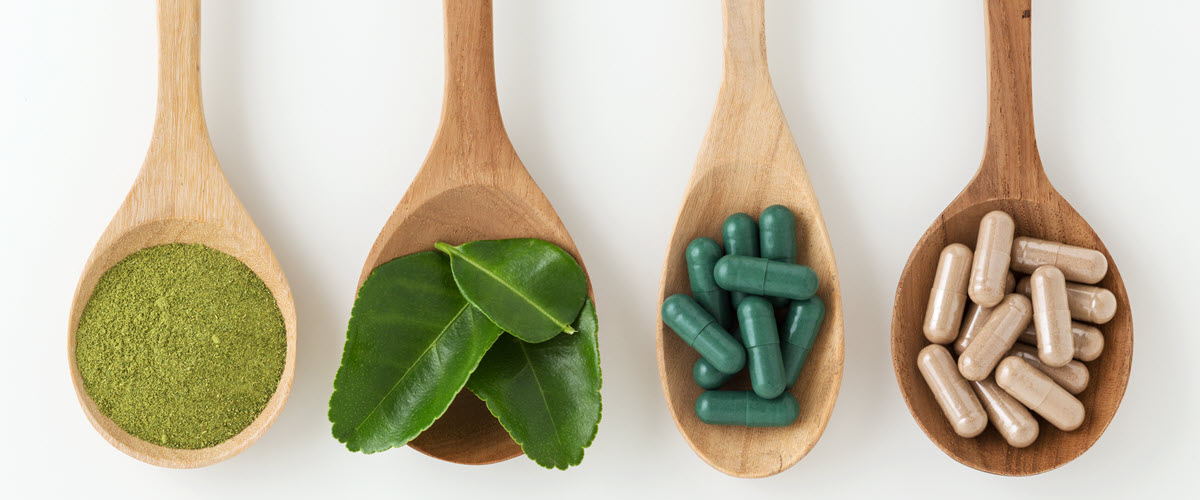
Tea Market
Get More Value from Your Tea: BRU Maker One
+41794574278
Jacque's Organics
(647) 804-7263
Another great article, Peter. Wonderful that you’re getting facts out there direct to tea consumers.
Many thanks, Jaq. Great to follow your own work and the marvelous innovations in the Australian market
Hello Peter , I’ve been drinking chaparral,pau d’arco,chanca piedra for three days in large amounts. I assumed I can take it the same way I’ve taken other teas in the past . Yesterday I noticed small sharp pains in my kidney and liver area so I stopped drinking last night. The pain isn’t bad ,but it’s a little nerve wracking because I never felt pain in those areas . Is it possible for the pain to go away on its own with me staying away from the tea for awhile ? I will pay attention to it,if it gets worse then I will go to my doctor .
It sounds like Peter is working for the Drug industry. Just replace the words Herbs or herbal infusions with the words OTC drugs and his cautions are valid. Or how about caffeine or sugar…I have watched many indigenous people handpick herbs for enjoyment and prevention with great success. We need respect for all consumption but the benefits are there.
Agree 100% with Bob Krul: This highly cautionary “Know the Risks!” article would be far more appropriate directed at OTC drugs and supplement markets. It’s a valid point that anyone with chronic disease, pregnant, over a ‘certain age’ or using prescribed medications should check with their physician when considering supplements, herbal remedies, or ‘natural products’ to self medicate. However, very few physicians have any training about botanicals or herbal ingredients other than referring to a PDR (Physicians Desk Reference) for potential issues. A traditional pharmacist would likely have more expertise and information ‘at hand’ to consult for possible drug interactions.
I am in favor of more stringent oversight regarding the herbal supplement market. Supplements should be tested for safety and be free of contaminants, toxic ingredients, and contain only the ingredients listed on the label. However, my issue with this article is that it would require far more exposure and abnormally heavy consumption of any particular herb to produce some of the side effects described, such as those referenced with chamomile, mint, or hibiscus infusions. Exactly what comprises a ‘heavy dose’ in the author’s opinion? Two cups of chamomile tea instead of one? For example — using sugar as a common and relatively ‘safe’ ingredient: compare using 1 teaspoon vs. 1 cup of sugar daily. Obviously consuming 1 cup of sugar every day would be very unhealthy and produce ill effects (obesity, heart disease, dental disease, etc.). It would certainly be considered a ‘dangerous’ ingredient with serious side effects for people who are diabetic. But used in ‘normal’ amounts, (i.e., 1 or 2 teaspoons) most people are not likely to have an adverse reaction unless they have an endocrine/metabolic disease.
Additionally, imported teas (not just herbal ingredients) are easily as contaminated as any other ingredients the author lists in his article. There is tea that comes into this country claiming to be ‘organic’ with reassuring logos/stamps by various certification boards that is tainted. With over 28 years in the tea industry and having been an early direct importer, I learned to doubt the veracity of any ‘organic’ claims made outside of the US. Unless you’re willing to cover the expense of re-testing and certifying every batch in the US that is purchased, chances are you may have a product contaminated by pesticide drift, heavy metals, extraneous materials (i.e., hair, fabric threads, small plastic or wood pieces), and possibly soil-borne bacteria. Confronting unscrupulous foreign companies selling contaminated ‘organic’ tea is met with shoulder shrugs and a ‘so what’ attitude. They count on no further testing in the supply chain, and are unconcerned about legal reprisal from smaller US companies. As a result of poor business practices and a shocking lack of integrity, we only buy from two companies that represent two ‘clean’ regions in China and insist on US testing and certification before purchasing and spot check purchases once they arrive. We no longer direct import tea, spices or herbs.
Yes, ingredient safety and possible drug interactions matter — but the inference of this article is everyone should question ‘the risk’ of their bedtime cup of chamomile or reconsider that cup of mint tea to settle a woozy tummy — or – (OMG) face ill effects. Exactly how much hibiscus tea would have to be drunk to reduce blood pressure by 7 points, to interfere with hormones, or create hallucinations? That would be helpful information.
Intending no disrespect to the author, this article overstates the side effects of common herbal teas. Granted, there are herbal blends may contain certain ingredients that need to be avoided by those on medications or have specific medical issues. It’s a good practice to share any herbal supplements (including drinks) that you consume with your primary physician. Ultimately, it comes down to common sense and self responsibility. If someone is going to write about the ‘risks’ of drinking herbal teas, please include how much plant material it would take to induce a particular negative side effect. And what would that consumption look like in a daily diet? Since many people are now choosing to consume drinks with less (or no caffeine) in the form of herbal blends, it would be far more beneficial to base an article on ‘real world’ consumption and habits and refrain from using bloated scare-tactics and dire warnings that apply to few people.
You mentioned two companies and two “clean” regions in China, what are their names, please. So far I’ve got nauseated from drinking tea by Teavivr and Verdant, I can only assume it’s because of pesticides.
Peter Luong at Red Blossom Tea in San Francisco, explains that “in China, most traditional farms are not certified organic, even if they’ve been growing tea without synthetic additives or modern methods for generations. Their tea commands high prices without certification, and they wouldn’t be able to produce enough to satisfy greater demand.” However, several firms that export tea including ZTG, the world’s largest green tea exporter, find it helpful to obtain JAS, EU, or USDA NOP certifications (many qualify for all three). While China banned synthetic fertilizers and chemical pesticides in several tea-growing regions, it is more reliable to simply verify the business has a NOP certificate. These are available publicly on the USDA website.
Thank you Ann K. Better said than my attempt to support a healthful alternative from kind and generous people associated with ethically harvesting a sustainable product based on historical tradition. We have much to learn.
Very helpful article, Peter!
Is it safe to drink Restful Sleep tea half an hour before going to bed which contains valerian,chamomile,passion flower and skullcap while taking blood pressure pills?
I don’t think herbal teas are risk as long as your mixing with anything else. It is good to have herbal teas as they are made up of natural herbal ingredients and also no caffeine in them.
My ENT warned me off peppermint tea, because the menthol might be a factor in my hoarseness. He suggested I drink chamomile instead–and he had just reviewed my meds list, which shows that I am on dual anti-coagulant treatment. This makes me wonder about the mention of “bleeding problems”; I’ll have to look on PubMed.
Ed Note: https://www.nccih.nih.gov/health/chamomile